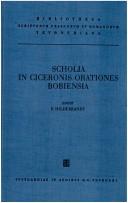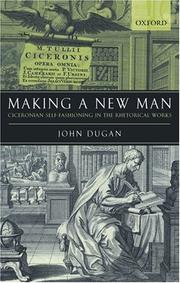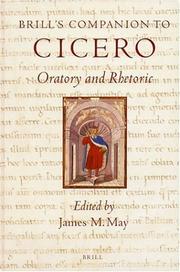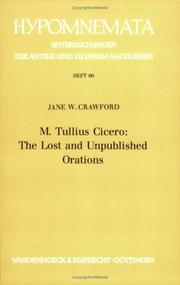| Listing 1 - 7 of 7 |
Sort by
|
Book
ISBN: 3631850131 9783631850138 Year: 2021 Publisher: Berlin: Peter Lang,
Abstract | Keywords | Export | Availability | Bookmark
 Loading...
Loading...Choose an application
- Reference Manager
- EndNote
- RefWorks (Direct export to RefWorks)
Historical exempla were an important part of the Roman political discourse. They could serve as a moral guide to conduct, but also lend credibility to an orator’s argument. In his extant orations, Cicero often draws parallels between his contemporaries and the old Romans or, less frequently, he compares the Romans of the present day with non-Roman individuals. Cicero himself calls such foreign examples ‘exempla externa.’ Using a theoretical framework that combines the precepts of ancient rhetorical theory and modern terminology, this book explores the ways in which Cicero employed exempla externa in oratorical practice. It argues that there were many different categories of exemplum for Cicero to choose and that exempla externa were not necessarily suitable for negative lessons.
Book
Year: 1702 Publisher: Antverpiae: apud Hieronymum Verdussen,
Abstract | Keywords | Export | Availability | Bookmark
 Loading...
Loading...Choose an application
- Reference Manager
- EndNote
- RefWorks (Direct export to RefWorks)

ISBN: 3519012383 9783519012382 Year: 1971 Publisher: Stuttgart: Teubner,
Abstract | Keywords | Export | Availability | Bookmark
 Loading...
Loading...Choose an application
- Reference Manager
- EndNote
- RefWorks (Direct export to RefWorks)
Cicero, Marcus Tullius --- Cicero, Marcus Tullius. --- Speeches, addresses, etc., Latin --- History and criticism --- Scholia --- -Latin orations --- Latin speeches --- -T︠S︡it︠s︡eron, Mark Tulliĭ --- Cyceron --- Cicéron --- Kikerōn --- Cicerón, M. Tulio --- Ḳiḳero --- Cicerone --- Cicerón, Marco Tulio --- Ḳiḳero, Marḳus Ṭulyus --- Tullius Cicero, Marcus --- Kikerōn, M. T. --- Cicerone, M. T. --- Cicerone, M. Tullio --- Cicero --- Cicero, M. T. --- Cyceron, Marek Tulliusz --- ציצרון, מארקוס טולליוס --- קיקרו, מארקוס טוליוס --- קיקרו, מרקוס טוליוס --- キケロ --- 西塞罗 --- -History and criticism --- -Scholia --- -Cicero, Marcus Tullius --- Cicéron, Marcus --- -Cicero --- Scholia. --- Speeches, addresses, etc., Latin - History and criticism --- Cicero, Marcus Tullius - Speeches - Scholia --- Cicero, Marcus Tullius - Speeches

ISBN: 0199267804 9780199267804 0191708151 Year: 2005
Abstract | Keywords | Export | Availability | Bookmark
 Loading...
Loading...Choose an application
- Reference Manager
- EndNote
- RefWorks (Direct export to RefWorks)
In Making a New Man John Dugan investigates how Cicero (106-43 BCE) uses his major treatises on rhetorical theory (De oratore, Brutus, and Orator) in order to construct himself as a new entity within Roman cultural life: a leader who based his authority upon intellectual, oratorical, and literary accomplishments instead of the traditional avenues for prestige such as a distinguished familial pedigree or political or military feats. Eschewing conventional Roman notions of manliness, Cicero constructed a distinctly aesthetized identity that flirts with the questionable domains of the theatre and the feminine, and thus fashioned himself as a "new man."
Ancient oratory --- Ancient rhetoric --- Antieke redekunst --- Antieke retoriek --- Antieke welsprekendheid --- Art oratoire de l'Antiquité --- Ik in de literatuur --- Moi dans la littérature --- Oratory [Ancient ] --- Redekunst van de Oudheid --- Retoriek [Antieke ] --- Retoriek van de Oudheid --- Rhetoric [Ancient ] --- Rhétorique ancienne --- Rhétorique de l'Antiquité --- Self in literature --- Orators --- Oratory, Ancient. --- Rhetoric, Ancient. --- Self in literature. --- Speeches, addresses, etc., Latin --- History and criticism. --- Cicero, Marcus Tullius. --- Soi dans la littérature --- Zelf in de literatuur --- Oratory, Ancient --- Rhetoric, Ancient --- Classical languages --- Greek language --- Greek rhetoric --- Latin language --- Latin rhetoric --- Speakers --- Elocutionists --- History and criticism --- Rhetoric --- Cicero, Marcus Tullius --- Speeches, addresses, etc. [Latin ] --- Rome --- Greek & Latin Languages & Literatures --- Languages & Literatures --- Cicero, Marcus Tullius. - Speeches

ISBN: 9004121471 9786610464760 1423712498 1280464763 9047400933 9781423712497 9789047400936 9781280464768 9789004121478 Year: 2002 Publisher: Leiden Boston Brill
Abstract | Keywords | Export | Availability | Bookmark
 Loading...
Loading...Choose an application
- Reference Manager
- EndNote
- RefWorks (Direct export to RefWorks)
This volume is intended as a companion to the study of Cicero's oratory and rhetoric for both students and experts in the field: for the neophyte, it provides a starting point; for the veteran Ciceronian scholar, a place for renewing the dialogue about issues concerning Ciceronian oratory and rhetoric; for all, a site of engagement at various levels with Ciceronian scholarship and bibliography. The book is arranged along roughly chronological lines and covers most aspects of Cicero's oratory and rhetoric. The particular strength of this companion resides in the individual, often very original approach to sundry topics by an array of impressive contributors, all of whom have spent large portions of their careers concentrating upon the oratorical and rhetorical oeuvre of Cicero. A bibliography of relevant items from the past 25 years, keyed to specific Ciceronian works, completes the volume. Brill's Companion to Cicero will become the standard reference work on Cicero for many years.
Rhetoric, Ancient. --- Cicero, Marcus Tullius. --- Speeches, addresses, etc., Latin --- History and criticism. --- Ancient rhetoric --- Antieke retoriek --- Retoriek [Antieke ] --- Retoriek van de Oudheid --- Rhetoric [Ancient ] --- Rhétorique ancienne --- Rhétorique de l'Antiquité --- Discours latins --- Rhétorique ancienne --- Histoire et critique --- Rome --- History --- Sources. --- Histoire --- Sources --- Rhetoric, Ancient --- Classical languages --- Greek language --- Greek rhetoric --- Latin language --- Latin rhetoric --- History and criticism --- Rhetoric --- Rim --- Roman Empire --- Roman Republic (510-30 B.C.) --- Romi (Empire) --- Byzantine Empire --- Rome (Italy) --- Cicero, Marcus Tullius --- Speeches, addresses, etc. [Latin ] --- Republic, 265-30 B.C. --- Cicero, Marcus Tullius. - Speeches. --- Cicero, Marcus Tullius. - Rhetorical works.

ISBN: 3525251785 9783525251782 Year: 1984 Volume: Heft 80 Publisher: Göttingen: Vandenhoeck und Ruprecht,
Abstract | Keywords | Export | Availability | Bookmark
 Loading...
Loading...Choose an application
- Reference Manager
- EndNote
- RefWorks (Direct export to RefWorks)
Classical Latin literature --- Speeches, addresses, etc., Latin --- Lost literature --- Discours latins --- Oeuvres perdues (Littérature) --- History and criticism --- Histoire et critique --- Cicero, Marcus Tullius. --- Speeches, addresses, etc, Latin --- Cicero, Marcus Tullius --- -Speeches, addresses, etc., Latin --- -Lost literature --- Literature --- Latin orations --- Latin speeches --- T︠S︡it︠s︡eron, Mark Tulliĭ --- Cyceron --- Cicéron --- Kikerōn --- Cicerón, M. Tulio --- Ḳiḳero --- Cicerone --- Cicerón, Marco Tulio --- Ḳiḳero, Marḳus Ṭulyus --- Tullius Cicero, Marcus --- Kikerōn, M. T. --- Cicerone, M. T. --- Cicerone, M. Tullio --- Cicero --- Cicero, M. T. --- Cyceron, Marek Tulliusz --- ציצרון, מארקוס טולליוס --- קיקרו, מארקוס טוליוס --- קיקרו, מרקוס טוליוס --- キケロ --- 西塞罗 --- Speeches, addresses, etc., Latin. --- History and criticism. --- -History and criticism --- -Latin orations --- Cicéron, Marcus --- Oeuvres perdues (Littérature) --- Speeches, addresses, etc., Latin - History and criticism --- Lost literature - Rome --- Cicero, Marcus Tullius - Speeches
Book
ISBN: 9781107068582 9781107705999 9781107640740 1107705991 1108651275 1107068584 1108577342 9781108651271 1107640741 Year: 2019 Publisher: Cambridge, United Kingdom New York, NY
Abstract | Keywords | Export | Availability | Bookmark
 Loading...
Loading...Choose an application
- Reference Manager
- EndNote
- RefWorks (Direct export to RefWorks)
"Cicero never died. His assassins mutilated his corpus. They cut off his head and hands to eradicate his memory and spiritual legacy. Yet Cicero's genius survived the accidents of time and stamped its mark on every age. As predicted by the Roman historian Velleius Paterculus, Cicero's intellect and eloquence transcended the fragility and perishability of the human being. Murdered by the sword of Antony's hitmen, Cicero survived the fragility of life through his writings. The poignant scene of Cicero's violent death, recreated in dramatic forms by historians, poets and talented declaimers, pays tribute to the statesman's and orator's accomplishments and immortalizes the last fighter for the liberty of the Roman republic as the 'embodiment of verbal ingenium'"-- "Cicero saw publication as a means of perpetuating a distinctive image of himself as statesman and orator. He memorialized his spiritual and oratorical self by means of a very solid body of texts. Educationalists and schoolteachers in antiquity relied on Cicero's oratory to supervise the growth of the young into intellectual maturity. By reconstructing the main phases of textual transmission, from the first authorial dissemination of the speeches to the medieval manuscripts, and by re-examining the abundant evidence on Ciceronian scholarship from the first to the sixth century CE, Cicero and Roman Education traces the history of the exegetical tradition on Cicero's oratory and re-assesses the 'didactic' function of the speeches, whose preservation was largely determined by pedagogical factors"--
Education --- HISTORY / Ancient / General. --- Learning and scholarship --- Cicero, Marcus Tullius. --- Cicero, Marcus Tullius --- Influence. --- Cicéron, --- Discours --- --Influence --- --Éducation --- --Rome ancienne --- --Cicero, Marcus Tullius. --- Influence --- Erudition --- Scholarship --- Civilization --- Intellectual life --- Research --- Scholars --- T︠S︡it︠s︡eron, Mark Tulliĭ --- Cyceron --- Cicéron --- Kikerōn --- Cicerón, M. Tulio --- Ḳiḳero --- Cicerone --- M. Tulli Ciceronis --- Cicéron, Marcus --- Cicerón, Marco Tulio --- Ḳiḳero, Marḳus Ṭulyus --- Tullius Cicero, Marcus --- Cicerone, M. T. --- Kikerōn, M. T. --- Cicerone, M. Tullio --- Cicero --- Cicero, M. T. --- Cyceron, Marek Tulliusz --- ציצרון, מארקוס טולליוס --- קיקרו, מארקוס טוליוס --- קיקרו, מרקוס טוליוס --- キケロ --- 西塞罗 --- E-books --- Learning and scholarship - Rome --- Education - Rome --- Éducation --- Rome ancienne --- Cicero, Marcus Tullius. - Speeches --- Cicéron, 106-43 av JC
| Listing 1 - 7 of 7 |
Sort by
|

 Search
Search Feedback
Feedback About UniCat
About UniCat  Help
Help News
News